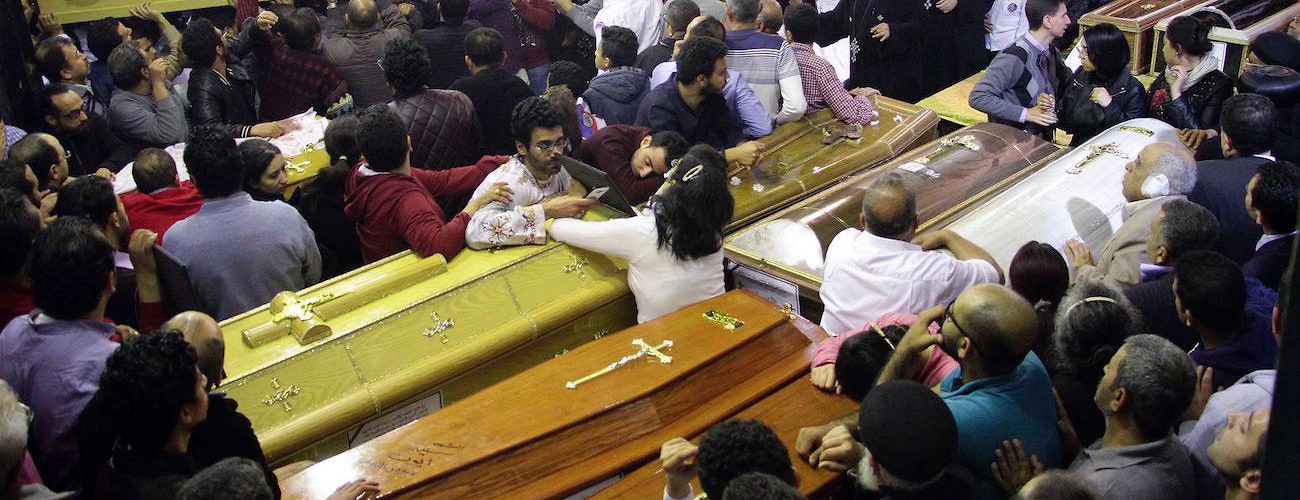Egyptian Christians gather around and carry coffins during the late night funeral of the victims of a blast which killed worshippers attending Palm Sunday mass at the Mar Girgis Coptic Orthodox Church in the Nile Delta City of Tanta, on April 9, 2017. (STRINGER/AFP/Getty Images)
Militants attacked two Coptic Christian churches in northern Egypt on April 9, killing over 40 people and wounding dozens more. In reaction to the blasts, which were claimed by the Islamic State, President Fatah el-Sisi deployed military forces to protect vital assets countrywide and declared a state of emergency. In following up on these actions, Sisi will need to walk a fine line between options that may stem the violence and merely intensify it. The regime’s approach to similar insecurity since 2013 has typically relied on brute force, against political as well as military opponents. This has ultimately caused further instability.
The bombings occurred on Palm Sunday, which begins a week of celebrations for Christians culminating in Easter Sunday. In addition to condemnation of ISIS, the attacks have seen criticism of Sisi and his government over perceived security lapses, by the Coptic Christian community, Muslim groups, civil society, and opposition political forces. Coptic members of parliament have even called on Sisi to fire Interior Minister Magdi Abdel-Ghaffar. These requests follows similar pleas in December last year in the wake of an ISIS-claimed bombing on St. Peter and St. Paul’s Church in Cairo, which left 27 dead.
ISIS has increasingly focused attacks on Egypt’s Christian community, which it presents as closely allied with the regime. This includes playing on perceptions that the Copts were tied to the forces that ousted the popularly elected Islamist regime of President Mohammed Morsi in 2013. ISIS has conducted regular attacks against Copts in the North Sinai region, causing large displacements of populations. It has a well-established pattern of seeking to aggravate social tensions between opposing religious groups, as well as between these groups and the state.
The recent bombings pose a major political test for Sisi and his military-backed regime. Since it obtained power in the 2013 coup the government has banned the Muslim Brotherhood, stifled political dissent, and positioned itself as a bulwark against insecurity and extremism. It has also defined itself as an ally of the Copts, a minority community of approximately nine million Egyptian Christians, which has previously faced discrimination at the hands of authorities.
With mounting anger from Coptic Christians and a highly symbolic visit by Pope Francis to Egypt scheduled for the end of this month (though this is now in doubt), authorities are likely to dedicate significant resources to identifying and eliminating militant hideouts and thwarting further attacks. The interior ministry issued a statement on April 10 indicating that its forces had already killed seven ISIS militants in Assiut. According to the government, these individuals were also planning to attack Christians. Widely publicizing these details is intended as much for an international audience as a domestic one. Attacks on Christian communities in Egypt do not play well in the West, particularly in countries where Christian-centered parties have significant influence.
The state of emergency declaration, which Parliament approved on April 11, will provide the authorities the power to further clamp down on militants. The police are likely to receive additional powers including over arrest and detention, and constitutional rights may be suspended, including limiting demonstrations and the activities of non-government organizations.
While presented as a logical step in response to a major security incident, the state of emergency remains a controversial decision domestically. Egypt was ruled under emergency rule for many years under the Hosni Mubarak regime and the excessive powers granted to the police were one of the critical catalysts for the events of 2011 that led to the downfall of his regime and the destabilizing events that followed. The current state of emergency will thus heighten anxiety among the political opposition, particularly given Sisi’s past record: Following the 2013 coup, his government used a short-term emergency law to arrest or detain thousands of Muslim Brotherhood supporters, in a crackdown that continues to resonate to this day.
Meanwhile, the government’s ability to meet a new spike in Egypt violence is uncertain, even as the number of attacks outside the North Sinai governorate has decreased in recent years. There remains an abundance of potential targets for militants and while the Egyptian military is strong, its counterterrorism capabilities remain questionable. ISIS is well aware of these deficiencies.
The government’s commitment to a largely brute force approach to tackling insecurity has backfired in the past. The crackdowns on the Muslim Brotherhood, have radicalized many of its members and led to the formation of a number of armed groups. The Hasm Movement, which has claimed several high-profile recent attacks, is one group thought to be linked to the Brotherhood. Stabilizing the country may ultimately depend on the government reversing its course against the Brotherhood, which maintains the support of millions of Egyptians. Failing to do so will continue to present ISIS and other armed groups as an attractive outlet for those opposed to the regime.





